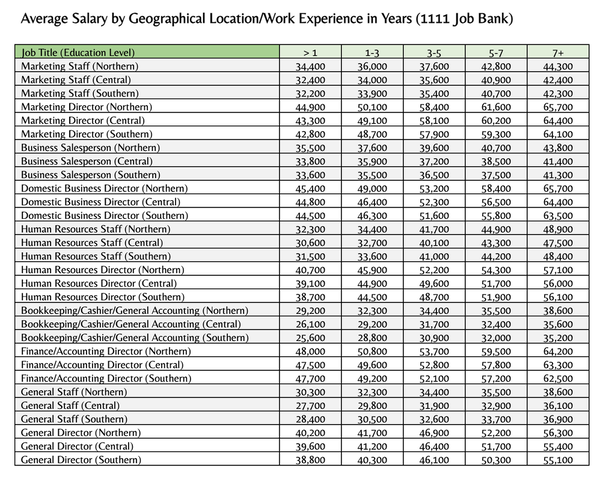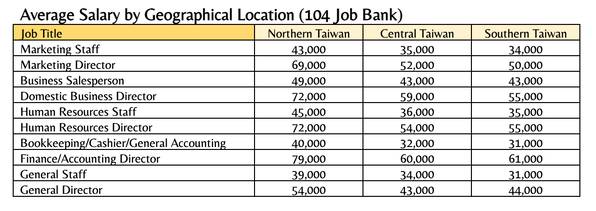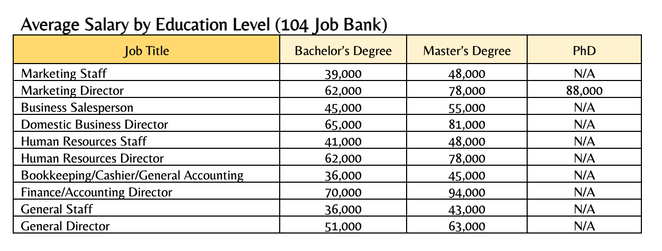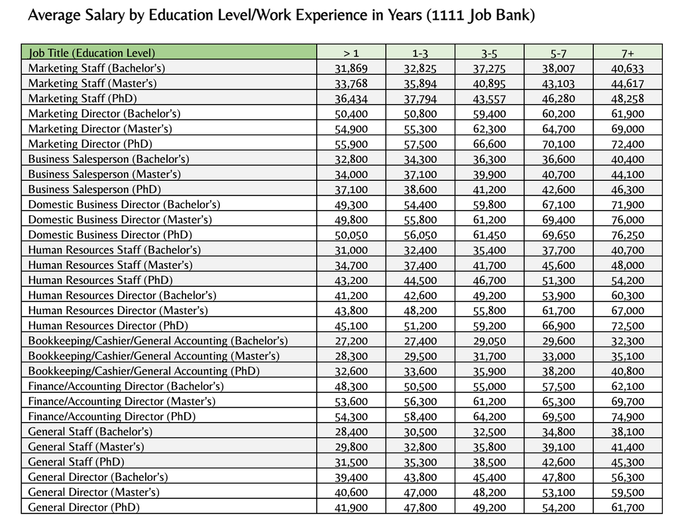Taiwan’s online job banks are a common hiring platform for both employers and employees, but there are some variations in salary trends among the two major sites. Data from the 1111 Job Bank site show labor costs across the island to be surprisingly consistent, as seen in the table below. Salaries in the north are only fractionally higher than salaries in central and southern parts of the island in virtually every examined industry, including marketing, sales, human resources, finance and accounting, and general staff. To illustrate, a business salesperson in northern Taiwan can expect to earn only about 7% more than a counterpart in central or southern Taiwan. This salary trend is consistent across experience levels. A senior human resources director, for example, earns a monthly salary of just 2% more in northern Taiwan than in central or southern parts of the country; someone in the same job with only one to three years of experience similarly earns just 3% more for locating in the north. The sole exception here seems to be bookkeepers, who see a 10-15% higher salary in northern Taiwan as compared to the remainder of the island. In contrast, workers looking at the 104 Job Bank, which covers a larger market share, can expect to see an average 25% higher wage in northern Taiwan for the same industries, and indeed salaries reported here are 30-38% higher in the north for Director positions in marketing, human resources, domestic business, and finance. The exception here is salaries for sales, which show only a 12% differential from north to south. Taken together, the job bank data indicate that the salary standard in the north is consistently higher than in central or south of the island, but generally by no more than about 25%. From an employer’s perspective, the salary differential between north and south could drive a strong location preference. Particularly if a business is looking to employ a large workforce, a payroll savings of 25% or more could mean huge operating cost savings for mid- and large-size companies. On a smaller scale, there is minimal discount for operating in the middle or south of the country, so location may be mostly negligible, particularly for smaller businesses hiring through the 1111 Job Bank. For an employee, establishing a work base in northern Taiwan likely means taking home a higher salary, so job-seekers may prioritize this consideration in applying for positions. However, employee cost of living is a factor, as rents in the north can be as much as 80% higher than in the south. This reality might incentivize companies to embrace hiring outside of the northern Taiwan region; industries that require very little client interaction could feasibly staff all back office personnel remotely, lowering salary overheads. Workers looking to optimize their earnings can consider remote work as well; by living in a smaller central- or southern-island location and seeking a remote position, employees can take home northern Taiwan salaries while enjoying a lower cost of living. Data indicate that salary increases commensurate with experience are generally straightforward. Companies can expect to hire most inexperienced employees for effectively the same industry-standard salary regardless of location. From there, salaries increase around 30% over ten years for marketing staff, finance and accounting directors, and general staff. However, the 104 Job Bank data show slightly higher pay increases for Marketing Directors, General Directors, and Human Resources staff, at around 40-50% increase over ten years. The biggest pay increase occurs for experienced Human Resources Directors, who can expect an average increase of more than 70% over ten years. A final part of the picture is education level. The pay differential between a bachelor’s degree and a master’s degree is anywhere from 2– 20% for most fields (with a slightly larger increase for Finance and Accounting directors who hold a master’s degree) without a significant difference with respect to geography. This reality offers employers a greater versatility in location. Regardless of whether companies set up in regional hubs or establish in less costly areas of the island, there are rarely premium salary costs for workers with advanced degrees. For employees with a bachelor’s degree, there remains the question of whether pursuing an advanced degree is a worthwhile means of achieving a salary increase. There is no overarching trend, as advanced degree holders are compensated differently depending on experience and industry. Data show the potential for a salary increase of anywhere from 2%–42% for advanced degrees. For example, according to the 1111 Job Bank, a starting business director with a Master’s degree earns an average of just NT$500 per month more than a counterpart with a Bachelor’s degree, whereas a starting human resources worker possessing a PhD could expect to bring in a 40% higher salary than a new employee with only a four-year degree. Such a range suggests several contributing factors. First, a candidate’s ability to leverage an advanced degree during salary negotiations is likely a key determination in their ultimate level of remuneration. More crucially, salary trends seem to show that experience is more consistently rewarded than education. Overall, Taiwan offers quite a strong labor pool accessible at fair, relatively consistent salaries all over the island, and workers with advanced degrees are widely available at reasonable salaries.
1 Comment
5/12/2022 09:09:25 am
Thank you for these detailed statistics. Figures in public sources, including Wikipedia, are not always accurate.
Reply
Leave a Reply. |
Archives
September 2023
Categories
All
|







 RSS Feed
RSS Feed